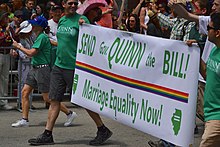Same-sex marriage in Illinois
The law went into effect (statewide) on June 1, 2014, with same-sex couples able to apply for marriage licenses and then marry after the mandatory one-day waiting period.On February 21, 2014, a U.S. District Court judge ruled that same-sex couples in Cook County could marry immediately and need not wait for the law to take effect on June 1.An opinion by the Illinois Attorney General on March 4 announced that the ruling could apply to any county clerk who chose to issue marriage licenses to same-sex couples.[4] In 1989, a couple from Chicago, Rex Wockner and Paul Varnell, filed a complaint with the Illinois Department of Human Rights, alleging that the state discriminated on the basis of sex because it refused to allow same-sex marriages.[11] On February 18, 2009, Harris re-introduced the civil union bill,[12] which was reported out of committee following a 4–3 vote along party lines, with Democrats in support and Republicans opposed, but died on the floor.[21] On December 13, Harris and Steans announced plans for the General Assembly to consider the legislation before it dissolved early in January 2013.Instead, LGBT organizations and the bill's sponsors focused instead on increasing support for the legislation, with the goal of holding a vote in the October and November veto session of the House and Senate."[42] On January 1, 2013, the Archbishop of Chicago, Francis George, in a letter to Roman Catholic parishioners, wrote that enacting same-sex marriage was "acting against the common good of society", adding, "The state has no power to create something that nature itself tells us is impossible.[45] On January 10, United Methodist Bishop Sally Dyck endorsed the legislation, saying that "[m]arriage equality is a civil rights issue", even though her church forbids her from celebrating such marriages.[46] A group of business leaders, including representatives of Google, Orbitz, and Morningstar, Inc., on January 13 asked legislators to consider the economic advantages of enacting same-sex marriage, noting that "human capital drives innovation and growth" and "[m]arriage equality would strengthen the workforces of Illinois employers"."[48] Chicago Mayor Rahm Emanuel tweeted his reaction: "With one vote, countless couples will be acknowledged for what they are under the law – families just like everyone else."[49] Bishop Larry D. Trotter of the Sweet Holy Spirit Church in Chicago, who helped lead opposition to the bill, applauded legislators "who stood up for God.[54] On November 30, it denied requests by the Church of Christian Liberty, the Grace Gospel Fellowship, and the Illinois Family Institute, opponents of same-sex marriage, to be allowed to intervene to defend the law.[55] In July 2013, following the U.S. Supreme Court's decision in United States v. Windsor, the plaintiffs in both cases filed motions for summary judgment, asking for a swift ruling in favor of same-sex marriage in Illinois.[60] In November 2013, Judge Thomas M. Durkin ordered that a lesbian couple, long-time activist and civil servant Vernita Gray and her partner Patricia Ewert, be allowed to marry because Gray was terminally ill.[61] On December 6, four same-sex couples filed a lawsuit, Lee v. Orr, in federal district court seeking the right to marry without waiting for the law to take effect on June 1, 2014.[67] Governor Quinn said that on the basis of Madigan's statement the Illinois Department of Public Health would record marriages issued by any county clerk.[73] Officials in Lake,[74] DeKalb,[75] Kane,[76] DuPage,[77] and McHenry counties said they would wait until June 1,[78] the effective date of the state statute.[78] On April 15, Equality Illinois confirmed that same-sex couples could marry in 16 counties: Cass, Champaign, Clinton, Cook, DeKalb, Greene, Grundy, Hardin, Jackson, Macon, McLean, Ogle, Perry, St. Clair, Wabash, and Woodford.

Legal status ofsame-sex unionsMarriageAndorraArgentinaAustraliaAustriaBelgiumBrazilCanadaColombiaCosta RicaDenmarkEcuadorEstoniaFinlandFranceGermanyGreeceIcelandIrelandLiechtensteinLuxembourgMexicoNetherlandsNew ZealandNorwayPortugalSloveniaSouth AfricaSwedenSwitzerlandTaiwanThailandUnited KingdomUnited StatesUruguayIsraelAmerican SamoaCivil unionsBoliviaCroatiaCyprusCzech RepublicHungaryLatviaMonacoMontenegroSan MarinoBermudaCayman IslandsMinimal recognitionBulgariaCambodiaHong KongLithuaniaNamibiaSint MaartenPolandRomaniaSlovakiaSame-sex union legislationSame-sex union court casesTimeline of same-sex marriageRecognition of same-sex unions in AfricaRecognition of same-sex unions in AsiaRecognition of same-sex unions in EuropeRecognition of same-sex unions in the AmericasRecognition of same-sex unions in OceaniaMarriage privatizationDivorce of same-sex couplesDomestic partnershipMilitary policyAdoptionLGBTQ rights by country or territoryCaribbean NetherlandsAruba and CuraçaoNiue, Tokelau, or the Cook IslandsBritish Overseas Territoriessome tribal nationsComan v. RomaniaEuropean Court of JusticeEU citizensguru–shishyanata prathamaitri kararpartnership certificatesSame-sex marriageIllinoisPat QuinnIllinois General AssemblySenatemarriage licensesU.S. stateU.S. District CourtCook CountyChampaign CountyIllinois Attorney GeneralcountiesGrundyJacksonMcLeanSt. Clairmarriage licensesit-inhunger strikeCook County JailChicagoIllinois Department of Human RightsCook County State's AttorneyHawaiilegalize same-sex marriageState ConstitutionGreg HarrisDemocratsRepublicansIllinois House of RepresentativesHeather SteansGeneral Assemblydissolved97th General Assembly98th General Assemblyspecial sessionveto sessionstatutesMayor of ChicagoRahm Emanuel